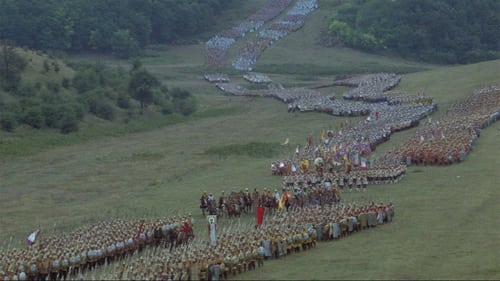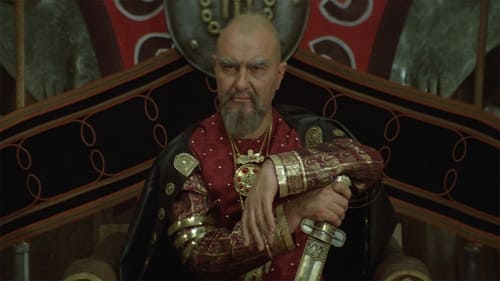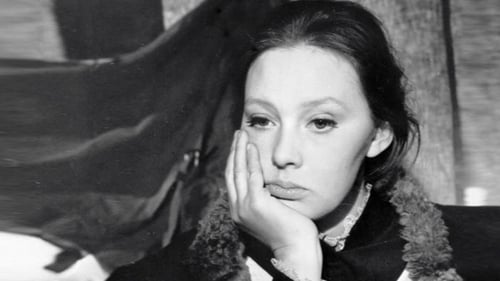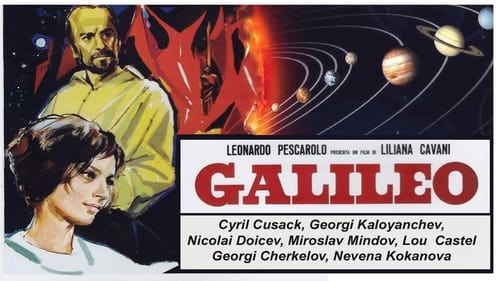
Georgi Cherkelov
Nascimento : 1930-06-25, Haskovo, Bulgaria
Morte : 2012-02-19
História
Georgi Cherkelov was a Bulgarian stage and film actor. He is one of the most prominent names in the Bulgarian theater and cinema in the last decades. Born as Georgi Ivanov Cherkelov on June 25, 1930, in the city of Haskovo, Bulgaria, he initially began studying law at the Sofia University, where he remained for three years before transferring to the National Academy for Theater and Film where he graduated in 1956. Cherkelov started his stage career in the Vratza theater. His film debut was in the 1961 film The Last Round. During the fifty years of his career, he has appeared in more than 100 roles on stage and in about 70 films. He became widely popular after the role of the anti-communist police inspector Velinski in the TV series At Every Kilometer (1969). Cherkelov appeared in many of the major Bulgarian film productions. He played the leading roles in Men on a business trip (1969), Warmth (1978), The Judge (1986). He was also in many German and Italian film co-productions. He has directed the TV film "Last Stop - Berlin" (1983). While continuing to perform on the stage of the National Theater where he has worked for decades, Cherkelov was also the artistic director of the Dramatic Theater in Pleven (1985-1990). Georgi Cherkelov was one of the most prominent Shakespearean actors in Bulgaria, with memorable performances as King Lear, Richard II, Mercutio, Banco and many other major roles. He has played almost the entire repertoire of the British bard - a privilege many actors dream of, but only a few are given. Cherkelov's style was intelligent, with expressions based on subtle nuances, heavy pauses and solidly spoken phrases. His trademark was inborn dignity, loaded calm and incredible presence - unique personal characteristics of this great actor, which he infused into the characters he played. In addition to being an extraordinary actor, Georgi Cherkelov has also staged a number of plays. Among the plays he directed are "One Flew Over the Cuckoo's Nest" (1982), "Wrestlers" (1981), "Huckleberry Finn" (1985), "Catcher in the Rye" (1998). Some of the adaptations for these plays he had written himself. In 2010 his book "Stories and emails" was published by Locus Publishing. In 2001, Georgi Cherkelov was decorated with the highest government prize, the Order of the Balkan Mountains, awarded to Bulgarian citizens with particularly great merit to Bulgaria. In 2009, he received the award Asker for lifetime achievement. He died on February 19, 2012 after complications from a stroke.

A gigantic Christmas tree travels across Bulgaria towards the capital passing birthdays, pregnancies, a suicidal man and gypsies. The countless stories on the way sketch a realistic and poetic image of this brand new member of the European Union.

Priyatel
The story largely centers on a grandfather who finds himself deeply depressed by the dramatic downward turns Bulgarian society has taken. The changes of the past half century have created a deep communications gap between generations and he is unable to communicate with his troubled son. Nor is the old man able to do much to help his grandson who is making his first forays into criminal life, blaming it all on his mother who admits she is incapable of loving him. The grandfather tires of life with the bleak family and so goes to an old folks home. But that proves repressive, so he and a couple of friends leave to enact a money-making scheme. When that fails, the old man finds himself alone and destitute on the rough streets of Sofia where his despairing eyes witness the further ruination of his homeland.

Judge Andrey Dimov
In 19th century, a new judge and four of his friends come in Bulgarian town with the knowledge that a golden treasure, once belonging to a Turkish ruler, is buried in the vicinity. But other people are also in search of treasure.

The story of St. Cyrilus (Constantine The Philosopher) in his quest of enlightening the Slavic people.

Rumen Abrashev
In the last moments of his life, the writer turns over episodes from his past. He finds the cause of another death, ahead of the last breath.

Velizariy's father
The last part of the epic "Khan Asparukh" - "Land Forever" is an impressive finish to scale narrative, created for the nationwide celebration of 13 century anniversary of the Bulgarian state. The authors collected in final chord all storylines, culminating in the political strengthening of the young Bulgarian state. In the center of the film epic again is the image of Khan Asparukh - a lofty romantic hero who embodies the virtues and energy of his people.

Velizariy's father
This is an epic screen presentation showing the creation, the consolidation and the power of First Bulgarian Kingdom and the first Bulgarian ruler Khan Asparuh. The second part of the great historical epic - "The Migration" - tells about the long journey to the land of the Bulgarians of today's Bulgaria. Here the young Khan Asparukh laid the foundations of the new state. The authors adhere to the established historical versions for this event. The film builds on the impressive mass scenes and the convincing served psychological characteristics of the main characters. The image of Asparoukh is a natural center of the story, in which many minor persons recreate the environment of the Khan. Romantic exalted, Asparukh is shown as capable leader of the people, consistently implement his own ideas.

Velizariy's father
This is an epic screen presentation showing the creation, the consolidation and the power of First Bulgarian Kingdom and the first Bulgarian ruler Khan Asparuh. This is the first part of the film trilogy about the events before the creation of the Bulgarian state in the middle of the VII century. Volga Bulgaria is straining under the attacks of the Khazars. Following the testament of his father, the sons of Khan Kubrat looking for a new home for their tribes. The youngest of them - Asparukh, wander 20 years in search of "land forever" for his people and reaches the mouth of the Danube. The film is narrated by captured Byzantine chronicler Belisarius, which should Asparukh in his journeys. Byzantine witnessed the heroic efforts of the Bulgarians to win the land south of the Danube and to create their new country.

In 651, Khan Kubrat died and the Khazars accelerated their raids upon Great Bulgaria. His five sons split the Bulgarian tribe and each led his to find new land where they could live in peace. Khan Asparukh, the youngest son, went west and, after an arduous journey lasting for years, southward across the River Danube, into Moesia. In 680-81, in alliance with the Slavs, he inflicted stunning defeats on the Roman legions and forced the Byzantine Empire to recognize the formation of the new state of Bulgaria in the lands where it still exists today.

Lambev
There are essentially two types of people: those who think with their stomachs, and those who think with their hearts.

The Academic
A tenement house needs to have steam heating installed. The residents find the necessary workers to do it, sign the contract and pay them in advance. The workers show up and start their job, but disappear immediately. Panic-stricken, the residents set up to search for them, only to find the workers in jail. Totally desperate, their only chance is to come up with an ingenious plan how to bring the work to the end.

1876. The Turks murder the parents of the 14-year-old Rali. His only relative is sentenced to life imprisonment in the Asian fortress. Rali walks after the condemned men. After a long and painful road, he reaches the fortress. He finds help from the old man and his daughter. With their assistance, he organizes the escape of the condemned. After numerous adventures the fugitives reaches the motherland. They enlist in a Bulgarian rebel army together with the Russian soldiers of the Russian-Turkish War for the freedom of Bulgaria.

Victor Hugo
The film is based on a true dramatic story of the fate of a wonderful Russian woman - Countess Yulia Petrovna Vrevskaya, one of the first Petersburg beauties. The events of the movie take place during the Russian-Turkish war for the liberation of the Bulgarian people from the Turkish yoke. An early widowed baroness, having left Petersburg, and having invested all her money in organizing a volunteer sanitary detachment, she becomes a sister of mercy on the front of the Bulgarian war with the Ottoman Empire of 1878.

General Karev
The film is based on the conflict between the Monarch of Bulgaria -Tsar Boris III and general Vladimir Zaimov during the Second World War and discusses different understandings about heroism and self-sacrifice.

Drago Badzhdarov
One explosion takes place in the lab of the research institute of a chemical plant. Emil takes the blame. The director of the institute orders the work on the case to be suspended. After his jail sentence, Emil equips a lab in the dwelling he is renting. A little before the end of experiments there is another explosion. Emil is in the hospital. A friend announces him that the experiment was a success. Next to Emil is the girl he loves.

Vatatzi
The film takes us back into the times of the Second Bulgarian Kingdom - 13th century. The Bulgarian Emperor - Tsar Ioan Assen - is trying through several marriages to enlarge the State and to support the peace in it.

the boss from the com-party
In a small town, two married people fall in love. What difficulties they will face and how to cope with them.

Colonel Demirev
In 1944 Bulgaria switches sides and joins the war against Germany. The story focuses on the advance of the Bulgarian army through Yugoslavia and Hungary, as well as its internal struggles.

Patriarch Ioakim
At the end of 13th and the beginning of the 14th century twenty-four-years old, Prince Svetoslav Terter takes the helm of the state. The young Prince engages in a intricate political game, into getting his way by means of court intrigues, and is forced by circumstances. Svetoslav Terter is remarkably shrewd and consistent. He is perhaps the only head of state at this time to take the liberty of impeaching the primate of the country's church. He tries to rally the neighboring Slav people to a joint resistance to the Turkish conquest. Terter lives through a great personal tragedy. He becomes estranged from his dearest person, Mariya, who is too weak to join him on the difficult road of his choice. (written by Georgi Djulgerov)

Kralev
A ravishing double agent Emil leaves for a large Western city where he joins the staff of a spy group operating against Bulgaria. Here he meets the elderly Mladenov. With his help, Emil gets an editorial job in a Bulgarian-language magazine. Dimov heads the spy center. Kralev is his deputy. Kralev wants to become a chief and tries to eliminate those who stand in his way. Emil is among them. Lida, Mladenov's daughter has defected from Bulgaria. Disillusioned, she asks Emil to help her to return. He helps her to hide in a small provincial town. Kralev forces him to give away the address. Emil goes to Lida's hotel, but before he arrives here, Kralev blocks his way. Emil makes short work of him. Together with Lida, they hire a speedboat, which rushes them to a Bulgarian ship.

Bizhev
Three separate novels are dealing with the never-ending problem of men's infidelity. How should women behave when men take a fancy to them? The picture ends in funny, sometimes comical, yet wise answer

Professor Dimov is a diplomat who has been recruited as a spy by a foreign intelligence service. The suspicions fall on Dr. Belcheva. Major Kalinov is entrusted with the investigation of the case. He learns that she is Dimov's mistress. Paris, France. Dimov and Belcheva go out leaving a bag with secret documents in Belcheva's hotel room. Kalinov manages to retrieve the documents. After this incident Belcheva dies in hospital from poisoning. On board the plane Kalinov exposes the professor as a spy. Bulgarian counterintelligence officers arrest him.

Stoev
In a white ward in a clinic a lifetime balance on the verge of death. Memories are herding together in the mind of seriously ill Aleksandrov, a scientist, who evaluates and reevaluates his own life: friendships, loves, career. Images of his youth are crowding in: of his beloved, of his children, of evenings, spent with his friends, ups and downs. And no one is able to say if all this made any difference.

Toskana's ambasador
A humble scientist from Padua proves that the Earth revolves and that it is not the center of the universe.

American filmmakers associated with the mafia are concerned about the great success of Bulgarian films around the world. They decided to send a big spy, Jesse James, to Bulgaria. His task is to blow up the film studios. But the Bulgarian inspector Lokum Shekerov is at his post.

the colonel of Police
Evtim Manasiev is an outstanding engineer. At the office, he has made a name for himself as a "whole-hogger boss". At home, his motto is: "Love me, love my dog". His children rebel against his acting at variance with his own principles. Tired and exasperated, Manasiev realizes that he has been wrong in some of his actions. On a holiday, he runs into Mihaylova, a subordinate of his whom he has recently fired undeservedly. The meeting urges him to reconsider and to review painfully all his previous life and principles. —Georgi Djulgerov

Inspector
Anna, nicknamed the She-wolf, is a young girl with provocative behavior, who actually hides an unhappy childhood without parents and real friends.

The editor-in-chief
What happens when a distracted newspaper editor-in-chief initials a "yes" to print a sharply critical feuilleton and a "no" to the feuilleton author's application for leave instead of the other? Well, an incredibly funny mess, which only the screenwriter Radoy Ralin and the director Vladimir Yanchev can mix. Of course, supported by the whole constellation of comedians that Bulgaria had in the early 60's. The commotion occurs when dozens of big and small bosses and directors from all over the country recognize themselves in Karaivanov, the fictional hero of the feuilleton. They all run to the editorial office to demand refutation and punishment of the author. Just watch as they bury themselves in an avalanche...

Editor
What happens when a distracted newspaper editor-in-chief initials a "yes" to print a sharply critical feuilleton and a "no" to the feuilleton author's application for leave instead of the other? Well, an incredibly funny mess, which only the screenwriter Radoy Ralin and the director Vladimir Yanchev can mix. Of course, supported by the whole constellation of comedians that Bulgaria had in the early 60's. The commotion occurs when dozens of big and small bosses and directors from all over the country recognize themselves in Karaivanov, the fictional hero of the feuilleton. They all run to the editorial office to demand refutation and punishment of the author. Just watch as they bury themselves in an avalanche...

Oberts Marof
Abundant supplies of imported vaccine prove ineffective against an outbreak of foot-and-mouth disease epidemic in several population centers. Warehouse manager Rashkov has been found dead. Major Zahov has to investigate the case.

Panov
The new supervisor Vasil arrives at the construction site of a dam. Vasil has problems with his men, who mistrust him and reluctantly submit to his perfectionism. He becomes involved with the refreshment bar attendant Lilyana. Vasil, who always wanted children, cannot abandon his childless wife and breaks with Lilyana. When four workers are buried in a tunnel landslide, Vasil makes his way to them and manages to drag them all out, except for Zlatan, a spiteful egocentric, whose legs are caught under a fallen prop. Zlatan begs Vasil to save him, even if it means cutting of his legs. To release the miner's legs Vasil cuts the prop, which is also supporting the roof of the tunnel. Zlatan is rescued. However, Vasil is killed. Since then, the workers say his steps can be heard bellow the dam wall.

Mechev

Young Nikolay is a national boxing champion. On a picnic, he meets Vanya and falls in love with her. They have a lunch in the restaurant and when a brawl erupts there, Vanya leaves. Nikolay tries to catch up with her in a car, but has an accident. The uncle of his friend offers to pay for repairs of a car if he will agree to act as a courier in foreign currency smuggling deal. Nikolay agrees to take along a box of matches. The uncle tells him that he will receive as many dollars as there are matchsticks in the box. Nikolay is due to leave for Paris to compete in the world championships. During the journey, his coach confiscates the box, thinking that the athlete is smoking. Nikolay has to explain everything.

Athos, Porthos, Aramis and D'Artagnan remember their youth and adventures, long battles and amorous adventures, they feel sorry for their Captain de Treville and do not lose sight of their eternal enemy - the Cardinal.







